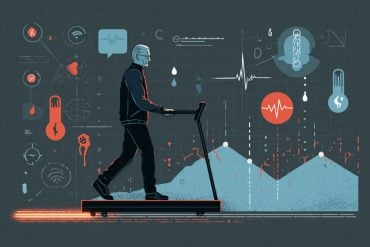Summary: People with high levels of neuroticism can be more avoidant in daily life as a coping mechanism, and this can commonly manifest into an addiction to the internet and social media.
Source: Inderscience
Quality of life is an ancient concept dating back to at least Aristotle, although the philosopher equated a good life or doing tasks well with happiness, rather than what we refer to today as quality of life. There is much talk of mental health and wellbeing today and the purported problems of neuroticism and addictive behavior. Nowhere does this seem to be more sharply in relief than when we talk of internet addiction and how this might be modulated by the neurotic type personality and be detrimental to quality of life.
Writing in the International Journal of Behavioural and Healthcare Research, a team from Iran discusses exactly how so-called internet addiction can have an effect on people of a neurotic disposition and their quality of life. Fundamentally, their study shows that neuroticism as a personality trait can lead to avoidance of everyday life as a coping mechanism and this is commonly manifest in dependency and addiction to the internet and perhaps more obviously online social media.
“Our results indicate that those [students] who score high in neuroticism are more prone to move towards addictive behavior such as internet addiction,” the team writes. This corroborates earlier independent work and also reinforces the idea that neuroticism is usually accompanied by an avoidance of face to face communication with other people. The internet and online social media lend themselves heavily to this behavior. The team adds that overuse of the technology required to engage with the internet—computers and mobile phones, for instance—often do not lend themselves to appropriate posture nor physical activity and in many cases lead to avoidable repetitive strain injury, all of which can have a negative impact on quality of life.
About this neuroscience research article
Source:
Inderscience
Media Contacts:
David Bradley – Inderscience
Image Source:
The image is in the public domain.
Original Research: Closed access
“Neuroticism and quality of life: the mediating role of internet addiction”. by Zahra Khayyer; Mohammd Ali Najinia; Reza Jafari Harandi.
International Journal of Behavioural and Healthcare Research doi:10.1504/IJBHR.2019.106989
Abstract
Neuroticism and quality of life: the mediating role of internet addiction
It seems that the number of internet users is constantly increasing. Especially young people show more interest in using social media. This may be related to certain personality traits and may affect different aspects of quality of life. The purpose of this study was to examine the mediating role of internet addiction in the effect of neuroticism on quality of life. A sample of 500 students was selected in three stages. After screening the students based on Young’s Internet Addiction, Neuroticism, and the Quality of Life scales, finally 275 participants were selected to be analysed. Our findings revealed a significant indirect effect of neuroticism on quality of life mediated by internet addiction (P < .001). In general, it can be concluded that neuroticism as a personality trait may cause a tendency in individuals toward avoidant coping strategies such as addictive behaviours. Educating the individuals on effective coping strategies can lead to an improvement in the quality of their life.
Feel Free To Share This Neuroscience News.








